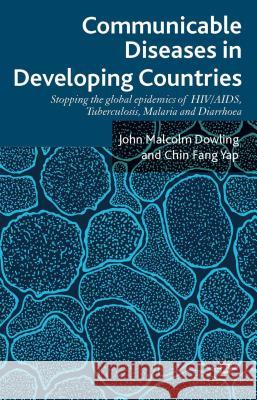Communicable Diseases in Developing Countries: Stopping the Global Epidemics of Hiv/Aids, Tuberculosis, Malaria and Diarrhea » książka
Communicable Diseases in Developing Countries: Stopping the Global Epidemics of Hiv/Aids, Tuberculosis, Malaria and Diarrhea
ISBN-13: 9781137354778 / Angielski / Twarda / 2014 / 219 str.
Communicable Diseases in Developing Countries: Stopping the Global Epidemics of Hiv/Aids, Tuberculosis, Malaria and Diarrhea
ISBN-13: 9781137354778 / Angielski / Twarda / 2014 / 219 str.
(netto: 384,26 VAT: 5%)
Najniższa cena z 30 dni: 385,52
ok. 22 dni roboczych
Bez gwarancji dostawy przed świętami
Darmowa dostawa!
For many developing countries coping with rapid population growth, this book provides an essential study of communicable diseases, in particular HIV/AIDS, tuberculosis, malaria and diarrhea. While many books exist on the treatment of different diseases and others deal with social and behavioral foundations of public health, this study integrates the diagnosis of the extent of the disease burden, treatment and cure of communicable diseases in developing countries together with the practical aspects of delivery of these services to the public.
Communicable Diseases in Developing Countries explores ways of improving public health through raising public awareness, staffing of public health centres, possible co-infection of different diseases (TB and HIV) and the integration of new developments in medicine into the delivery of public health services. It addresses these shortcomings and makes recommendations for increasing budgets for public health. This book analyzes health outcomes in developing countries and reports a wide ranging analysis of the determinants of HIV, tuberculosis, malaria and diarrhea in Africa, Asia and Latin America. Through a series of case studies on HIV, malaria, tuberculosis, diarrhea and other waterbourne diseases, it provides details on how recent developments in diagnosis and treatment of these communicable diseases have been successfully integrated into public health systems. Furthermore, recent developments in the interrelationship and coinfection of HIV and tuberculosis are investigated and statistical models are developed to trace the determinants of mortality rates due to HIV, tuberculosis, malaria and diarrhea over the past decade. The results further highlight the pressing need for government intervention for the high-risk vulnerable groups.
This book offers a significant insight into to the study of treatment and diagnosis of communicable diseases alongside the practical social implications. It makes indispensible reading for researchers, scholars and policy makers interested in health and welfare of developing countries.











